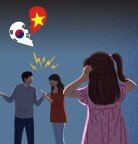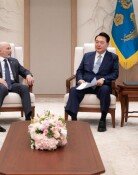Kim Jong Un's nuclear threats after his own coronation
Kim Jong Un's nuclear threats after his own coronation
Posted May. 11, 2016 07:30,
Updated May. 11, 2016 07:45
The first congress of North Korea's ruling Workers' Party of Korea in 36 years ended Tuesday after electing the country's leader Kim Jong Un as its chairman. The party's chairmanship, which Pyongyang called the "supreme post" of the party, is a revival of the position his grandfather, Kim Il Sung, assumed in June 1949, when the Workers' Party of the two Koreas were merged. Establishing his monolithic leadership system as his grandfather did and shifting the axis of his reign from his father's military-first policy to the party, the junior Kim had his own coronation ceremony as the successor of the hereditary dynasty. No matter what his official title is in the Kim dynasty, there is no change in his absolute power and status. He just came up with a new title in order to promote Kim Il Sung as the North's "eternal president" and Kim Jong Il as its "eternal general secretary."
Kim Jong Un declared North Korea as a "nuclear-possessing state" in the country's 2012 constitution and stated the simultaneous pursuit of economic and nuclear development by revising the party constitution, which is above the state constitution. Now, there is a slimmer chance that Pyongyang will abandon its nuclear weapons development without the collapse of Kim's regime. The United States once considered negotiating both the North's denuclearization and a peace agreement with Pyongyang, only to give up the possibility after confirming Kim's stubbornness with nuclear development. The international community's pressure on and confrontation with the North will likely intensify, while the two Koreas will likely be unable to make a breakthrough in bilateral relations for an extended period of time.
That leaves Seoul with no choice but to cooperate with the international community to force Pyongyang to give up its nuclear ambition. Seoul should review its strategy with extraordinary measures, including an ultimate regime change, in mind. The question is whether we are capable of doing so. Seoul's National Intelligence Service reported that Ri Yong Gil, former chief of the North Korean military, had been executed. However, he has been named an alternate member of the party's politburo. Kim Yo Jong, the North Korean leader's younger sister who the spy agency said was married and gave birth to a child, has been confirmed to be still single and named a member of the party's central committee. The KUH-1 helicopters that Seoul has boasted as a "masterpiece," have turned out to have defects. A North Korean spy agency is suspected to have hacked into the computer system of Hanjin Shipping, a South Korean defense company, stealing classified military information.
North Korea, which invited foreign journalists to show off the party congress to the world, expelled a BBC reporter for his reporting on the North. With such an unpredictable country's possession of nuclear weapons, we cannot guarantee our own survival. President Park Geun-hye should not stop at criticizing the North for continuing its threat of provocations while failing to show sincere changes to improve inter-Korean relations. She should straighten up Seoul's defense posture from the base by putting the South Korean military under strict discipline and punishing irregularities involving the local defense industry.
한기흥기자 eligius@donga.com







